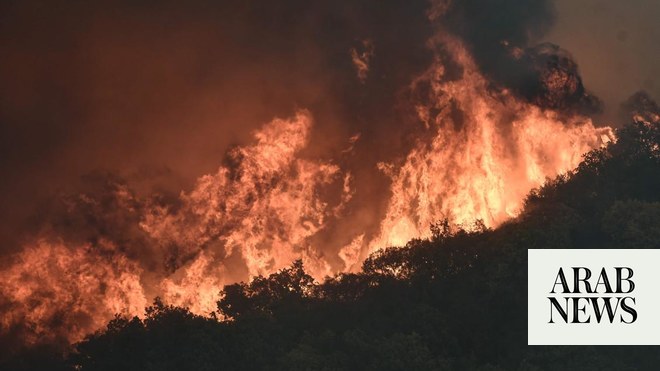
Greek authorities are battling fresh fires near the capital city Athens and on the island of Evia. The first broke out on Monday morning on Evia, which was decimated earlier this month by a blaze that burned for more than 10 days.
Two neighborhoods have been evacuated in Fygia as strong winds complicate efforts to contain the flames. A second fire was burning in the Vilia area northwest of Athens, where a major blaze was brought under control on Friday after burning for five days.
The fire was moving towards the seaside resort of Marmari, 200 km northeast of Athens, where authorities were also preparing to evacuate the population by boat, according to the Athens News Agency (ANA).
Greece’s fire department had scrambled firefighting helicopters, water bombers, and ground forces to assist with the effort.
In total, more than 116,000 hectares have been burnt in Greece since the end of July. Hundreds of homes and small businesses have been destroyed in Evia, in parts of the Peloponnese, and on the outskirts of the capital.
Two people, including a volunteer firefighter, have died this summer and at least four others have been hospitalized with burn injuries. Civil protection authorities had warned on Sunday that Greece was at "high risk" of fires in several parts of the country.
Scientists say there is little doubt that climate change from the burning of coal, oil and natural gas is driving more extreme events.
Wildfires are continuing to rip through Evia, prompting residents to flee to safety by sea. More than 2,000 people have been evacuated, with elderly residents carried on to ferries.The EU said it was mobilizing one of its biggest responses to tackle the wildfires affecting Greece and a number of other European nations.
Greece and neighboring Turkey have been battling devastating blazes for nearly two weeks as the region suffers its worst heatwave in decades. Temperatures have risen to 45C (113F) in Greece.
Heatwaves such as this are becoming more likely and more extreme because of human-induced climate change. The subsequent hot, dry weather is likely to fuel wildfires.
Giannis Kontzias, mayor of the municipality of Istiaia in the northern part of Evia, told local news: "It"s already too late, the area has been destroyed."
He appealed for more help from water-bombing planes and helicopters. But Civil Protection Chief Nikos Hardalias said the planes faced a number of difficulties including poor visibility caused by the fires.
A number of countries have responded to Greece"s call for help including France, Germany and the UK. The EU said member countries have now deployed nine planes, close to 1,000 fire fighters and 200 vehicles to Greece.
Late on Sunday, Prime Minister Kyriakos Mitsotakis expressed his "heartfelt gratitude" to countries that had sent assistance. "We thank you for standing by Greece during these trying times," he wrote on Twitter.
On Monday, Mitsotakis was due to chair a ministerial meeting to discuss relief measures for those who lost property in the fires. — Agencies












